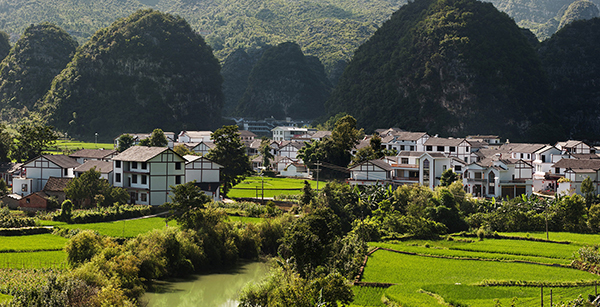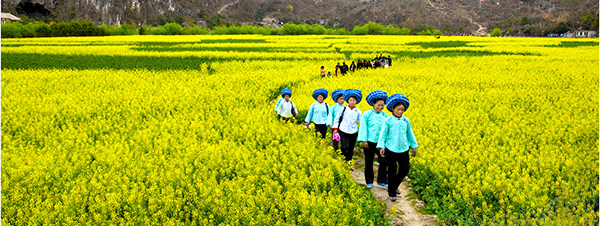 Nahui village in Xingyi, Guizhou province, was named last year as one of the Top 10 beautiful villages in China on a list jointly issued by several central government bodies.[ZENG JUN/CHINA DAILY]
Nahui village in Xingyi, Guizhou province, was named last year as one of the Top 10 beautiful villages in China on a list jointly issued by several central government bodies.[ZENG JUN/CHINA DAILY]

Like most women from the mountainous Nahui village who work the farmland in Southwest China's Guizhou province, Yang Chaozhen, 60, looks much older than her age.
Yang lives with her husband while her children and grandchildren work in Guangdong province.
Formerly, they had to work from dawn to dusk to earn a living, but since 2010, when the couple started to grow rape flowers in the scenic area of the Wanfenglin Peaks Forest, their lives changed for the better.
Wanfenglin Peaks Forest is a national 4-A tourist destination, located about 5 kilometers from Xingyi city, capital of Qianxinan prefecture in Guizhou province. It is famous for its rape flower fields and fresh air. The name in Chinese suggests it is a "forest surrounded by thousands of mountains." (There are five tourist attraction rating categories of China, with 1-A the lowest level and 5-A the highest.)
"We can get oil from the rape seeds, and the local government offers some allowances. We can earn up to 20,000 yuan ($3,200) every year, which is enough for a decent life," Yang says.
Nahui village is also known for its Bouyei, Miao and other ethnic cultures. The local government set up an office to boost rural tourism in 2010 and encouraged villagers to plant rape flowers in the area by providing free seeds, fertilizers and extra subsidies.
"Rape flowers can improve the Wanfenglin area's ornamental value and increase the incomes of villagers," says Cai Guohong, a local government official.
The oil extracted from rape seeds is very popular among tourists and is a special product made in a traditional way. Last November, Nahui village was named one of the Top 10 beautiful villages in China, on a list released jointly by the Ministry of Agriculture, the Ministry of Housing and Urban-Rural Development, and the China National Tourism Administration.
